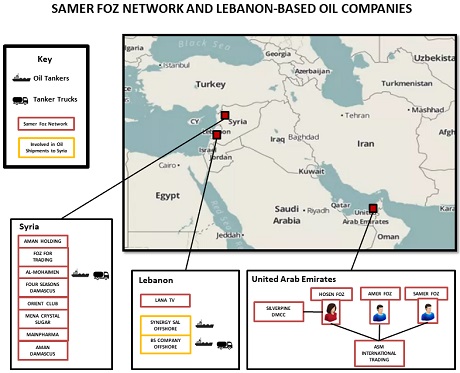ERBIL, Kurdistan Region — The United States on Tuesday placed financial sanctions on a Syrian businessman Samer Foz, his businesses, and relatives after they "have leveraged the atrocities of the Syrian conflict into a profit-generating enterprise."
The decision was part of the US Department of the Treasury’s Office of Foreign Assets Control (OFAC) designating 16 individuals and entities associated "an international network benefiting" the regime of Syrian President Bashar al-Assad.
"This Syrian oligarch is directly supporting the murderous Assad regime and building luxury developments on land stolen from those fleeing his brutality,” said Undersecretary for Terrorism and Financial Intelligence Sigal Mandelker in a statement.
Washington, now following the European Union's sanctions in January, says the 16 including Samer Foz and Aman Damascus participated in "joint ventures with regime-backed companies to develop land expropriated from person displaced by the conflict in Syria."
Graphic: US Treasury Department
It pointed to Marota City in the Mazzeh District of Damascus, where in 2012, "Assad signed a decree to expel citizens in poorer areas."
"This tactic — taking over property owned by Syrian citizens and handing the land to wealthy regime insiders to develop in exchange for revenue sharing — has emerged as Assad’s go-to strategy for high-end reconstruction in war-torn Syria," the US report claimed.
The United States ended a covert program aimed at throwing over Assad when President Donald Trump came to office in early 2017. Instead, the new administration has turned to financial sanctions to target foreign governments, individuals, and entities.
North Korea, Iran, Russia, Venezuela, Cuba and to a lesser extent Turkey have been targeted by Trump's administration.
In a 'Game of Thrones' like meme, Trump tweeted a photo of himself that was overlain with the words "Sanctions are coming - November 5." The message was directed at Iran. He has taken similarly threatening tones against other countries when speaking of sanctions.
The Financial Times has described the policy as "Donald Trump takes deployment of sanctions to new level" in a headline.
“You have a president who likes to have quick results and you have sanctions ... even the mere threat of them, can dramatically impact a target’s economy,” the FT quoted Daniel Tannebaum as saying last year.
He is an industry insider working for PwC United States as a Principal in its Financial Crimes Unit and the Leader of the Global Financial Services Practice.
The United Nations estimates around 400,000 people have been killed during the eight-year Syrian conflict. Half of all Syrians have been displaced at one time or another in that span.
The Syrian capital and its Eastern Ghouta suburb have been at the center of forced displacement following deals between the government and its Russian and Iranian backers with rebels backed by Turkey.
In the first four months of 2018 alone, 920,000 Syrians were displaced, according to the UN. Most fled to opposition-held areas of Idlib, Aleppo and Hama governorates in the country's northwest.
Idlib, in particular, has been heavily targeted by the Syrian government and its Russian backers for months.
Diplomatic paths to peace through the United Nations and trilateral Astana talks have yielded little progress for the people of Syria.




Comments
Rudaw moderates all comments submitted on our website. We welcome comments which are relevant to the article and encourage further discussion about the issues that matter to you. We also welcome constructive criticism about Rudaw.
To be approved for publication, however, your comments must meet our community guidelines.
We will not tolerate the following: profanity, threats, personal attacks, vulgarity, abuse (such as sexism, racism, homophobia or xenophobia), or commercial or personal promotion.
Comments that do not meet our guidelines will be rejected. Comments are not edited – they are either approved or rejected.
Post a comment